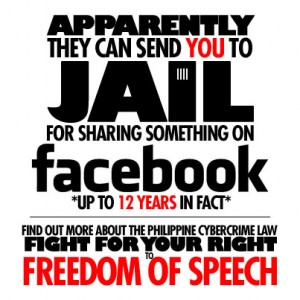Whatever form of work or stage in life you may be in, you will need an arena for self-portrayal and freedom of expression—the internet. That great big leap in technology will always be ready to connect relationships, ease work and express emotions. A single conference video call could bridge scattered acquaintances. A single message could inspire millions. It’s a hotbed of game-changing ideas and artistic expression.

Somewhere in the world today, a girl is crying. She rants about how her life is such a mess. Her boyfriend breaks up with her. Her father abuses her. Her friends forget her. Her family breaks apart. As an impulsive gesture, she trash talks to everyone in her Facebook. Swearing her family, enemies, government and everyone she think is the reason for her downfall. Some online friends who suffer the same problems as hers comfort her. She finds peace in the advices of foreign comrades who knows exactly how she feels—being left out and abandoned.
The internet can save lives. In our local homes, our problems might be of lighter use than as stated, but nevertheless, the World Wide Web is our everyday stress reliever, problem solver and most of all, satisfier for our craving of social interaction. However, what if the internet will be closely monitored and strictly controlled? The internet’s capability to act like just a passive freedom wall is the best asset that it has. Losing it would greatly affect the lives of trillions of people who rely on it.
“Introducing the electronic martial law my friends,” as Facebook users post it. Last October 3, 2012, RA 10175 or the Cybercrime Prevention Act of 2012 was implemented here in the Philippines. 13 Senators voted to pass the law and President Noy signed the bill.
This bill as enumerated in Chapter II of the Republic Act No. 10175 aims to minimize and if possible, eliminate completely, the crimes committable online like system and data interference, spread of viruses, misuse of public devices, cybersex, child pornography, cybersquatting and identity theft. Unintentionally however, the provisions stipulated especially the libel clause added by Senator Vicente Sotto III, gained massive criticism from online community because “the legal definition of libel whether in the RA No, 10175 or in Revised Penal Code does not address the nature of the content done by a person using the internet especially,” as activists put it. If proved to have committed the libel offense though traditional media, according to the Revised Penal Code stipulated in the RA no. 10175, you may be imprisoned up to 12 years or charged a fine of 200,000 pesos for damages committed. This even includes meek liking and sharing of posts in Facebook, and retweeting or tweeting in Twitter.
According to critics, the law itself is a violation of the fundamental right of a person to express his feelings or grievances especially to the government, as guaranteed in our 1987 Constitution, Article III, Section 4: “No law shall be passed abridging the freedom of speech, of expression, or of the press, or the right of the people peaceably to assemble and petition the government for redress of grievances.”
The girl earlier? We could see her behind the bars for merely expressing her grief and anger to the world. Her means of peace through the internet will be very limited now. Every single word she types needs to be carefully though about. Anyone is vulnerable to the law. The police can even raid houses without the owner’s consent. The face value of the crime committed is all they need to arrest.
“We are wary that this law, while intending to combat criminal activities on the Internet, unlawfully curtails the individual right to free speech. We are disturbed that this law, while hoping to respond quickly to offenses committed ‘online,’ gives blanket authority to the Executive Arm to restrict or control data on the Internet,” says Catholic Educational Association of the Philippines (CEAP) in a statement. In addition, “this law is ‘loosely defined’ and ‘prone to abuse’ by authorities and could result to the suppression of the people’s right to free expression,” explains Cagayan Rep. Jack Enrile.
Curbing cybercrime can be of big help to our nation. But as pitiful and obvious it may be, we have other bigger and worse problems to solve. The Cybercrime law is “a sign of poor Philippine government prioritization” imposes critics. Petty jailing of Facebook likers and Tweeters can’t minimize the booming over-the-top mortality and poverty rates of the Philippines. “Why would the government waste time investigating prone-to-fraud internet activities but scrap reality-based blood-associated massacres?”
The Philippine Cybergeddon, “the battle against the end of internet freedom,” has started. Would you fight for your right? Somewhere in the country now, somebody, like that poor girl, is jailed for merely liking a post against Sotto. Imagine how a single tap of a finger can lock you up in a cell for 12 years.
Photo Source: http://madmacarta.files.wordpress.com/2012/10/philippine-cybercrime-law.jpg?w=500